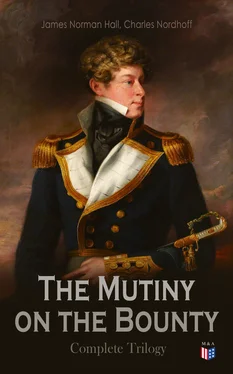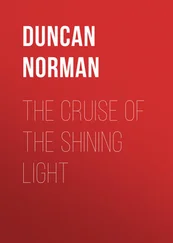1 ...7 8 9 11 12 13 ...48 “Let’s see—it must have been in seventy-eight. I was on the old Drake, Captain Burden, and we were on the lookout for Paul Jones’s Ranger at the time. Then we learned that she was hove-to off the mouth of Belfast Lough. An extraordinary affair, begad! We actually had sight-seers on board—one of them was an officer of the Inniskilling Fusileers in full uniform. We moved out slowly and came up astern of the American ship. Up went our colours and we hailed: ‘What ship is that?’ ‘American Continental ship Ranger!’ roared the Yankee master, as his own colours went up. ‘Come on—we’re waiting for you!’ Next moment both ships let go their broadsides.... Good God!”
The Bounty staggered with the shock of a great sea which broke into her at that moment. “Up with you, Byam!” ordered the surgeon; and, as I sprang out of his cabin toward the ladderway, I heard, above the creaking and straining of the ship and the roar of angry water, a faint shouting for all hands on deck. Then I found myself in an uproar and confusion very strange after the peace of the surgeon’s snuggery.
Bligh stood by the mizzenmast, beside Fryer, who was bawling orders to his mates. They were shortening sail to get the ship hove-to. The men at the clew lines struggled with might and main to hoist the stubborn thundering canvas to the yards.
My own task, with two other midshipmen, was to furl the mizzen topsail—a small sail, but far from easy to subdue at such a time. The men below brailed up the driver and made fast the vangs of its gaff. Presently the Bounty was hove-to, all snug on the larboard tack, under reefed fore and main topsails.
The great wave which had boarded us left destruction in its wake. All three of our boats were stove in; the casks of beer which had been lashed on deck were nowhere to be seen; and the stern of the ship so damaged that the cabin was filled with water, which leaked into the bread room below, spoiling a large part of our stock of bread.
In latitude 39°N. the gale abated, the sun shone out, and we made all sail for Teneriffe with a fine northerly wind. On the fourth of January we spoke a French merchant vessel, bound for Mauritius, which let go her topgallant sheets in salute. The next morning we saw the island of Teneriffe to the southwest of us, about twelve leagues distant, but it fell calm near the land and we were a day and a night working up to the road of Santa Cruz, where we anchored in twenty-five fathoms, close to a Spanish packet and an American brig.
For five days we lay at anchor in the road, and it was here that the seeds of discontent, destined to be the ruin of the voyage, were sown among the Bounty’s people. As there was a great surf on the beach, Lieutenant Bligh bargained with the shore boats to bring off our water and supplies, and kept his own men busy from morning to night repairing the mischief the storm had done our ship. This occasioned much grumbling in the forecastle, as some of the sailors had hoped to be employed in the ship’s boats, which would have enabled them at least to set foot on the island and to obtain some of the wine for which it is famous, said to be little inferior to the best London Madeira.
During our sojourn the allowance of salt beef was stopped, and fresh beef, obtained on shore, issued instead. The Bounty’s salt beef was the worst I have ever met with at sea, but the beef substituted for it in Teneriffe was worse still. The men declared that it had been cut from the carcasses of dead horses or mules, and complained to the master that it was unfit for food. Fryer informed Bligh of the complaint; the captain flew into a passion and swore that the men should eat the fresh beef or nothing at all. The result was that most of it was thrown overboard—a sight which did nothing to soothe Bligh’s temper.
I was fortunate enough to have a run ashore, for Bligh took me with him one day to wait upon the governor, the Marquis de Brancheforté. With the governor’s permission Mr. Nelson ranged the hills every day in search of plants and natural curiosities, but his friend the surgeon only appeared on deck once during the five days we lay at anchor. Old Bacchus had ordered a monstrous supply of brandy for himself—enough to do the very god of wine, his namesake, for a year. Not trusting the shore boats with such precious freight, he had obtained the captain’s permission to send the small cutter to the pier, and when a man went below to inform him that his brandy was alongside, the surgeon came stumping to the ladderway and clambered on deck. The cutter was down to the gunwales with her load; as there was a high swell running, Old Bacchus stood by the bulwarks anxiously. “Easy with it!” he ordered with tender solicitude. “Easy now! A glass of grog all around if you break nothing!” When the last of the small casks was aboard and had been sent below, the surgeon heaved a sigh. I was standing near by and saw him glance at the land for the first time. He caught my eye. “One island’s as like another as two peas in a pod,” he remarked indifferently, pulling out a handkerchief to mop his fiery face.
When we sailed from Teneriffe, Bligh divided the people into three watches, making Christian acting lieutenant, and giving him charge of the third watch. Bligh had known him for some years in the West India trade, and believed himself to be Christian’s friend and benefactor. His friendship took the form of inviting Christian to sup or dine one day, and cursing him in the coarsest manner before the men the next; but in this case he did him a real service, since it was ten to one that, if all went well on the voyage, the appointment would be confirmed by the Admiralty, and Christian would find himself the holder of His Majesty’s commission. He now rated as a gentleman, with the midshipmen and Bligh; and Fryer was provided with a grievance both against the captain, and—such is human nature—against his former subordinate.
Nor were grievances wanting during our passage from Teneriffe to Cape Horn. The people’s food on British ships is always bad and always scanty—a fact which in later days caused so many of our seamen to desert to American vessels. But on the Bounty the food was of poorer quality, and issued in scantier quantities, than any man of us had seen before. When Bligh called the ship’s company aft to read the order appointing Christian acting lieutenant, he also informed them that, as the length of the voyage was uncertain, and the season so far advanced that it was doubtful whether we should be able to make our way around Cape Horn, it seemed necessary to reduce the allowance of bread to two thirds of the usual amount. Realizing the need for economy, the men received this cheerfully, but continued to grumble about the salt beef and pork.
We carried no purser. Bligh filled the office himself, assisted by Samuel, his clerk—a smug, tight-lipped little man, of a Jewish cast of countenance, who was believed, not without reason, to be the captain’s “narker” or spy among the men. He was heartily disliked by all hands, and it was observed that the man who showed his dislike for Mr. Samuel too openly was apt to find himself in trouble with Lieutenant Bligh. It was Samuel’s task to issue the provisions to the cooks of the messes; each time a cask of salt meat was broached, the choicest pieces were reserved for the cabin, and the remainder, scarcely fit for human food, issued out to the messes without being weighed. Samuel would call out “Four pounds,” and mark the amount down in his book, when anyone could perceive that the meat would not have weighed three.
Seamen regard meanness in their own kind with the utmost contempt, and that great rarity in the Service, a mean officer, is looked upon with loathing by his men. They can put up with a harsh captain, but nothing will drive British seamen to mutiny faster than a captain suspected of lining his pockets at their expense.
Читать дальше











